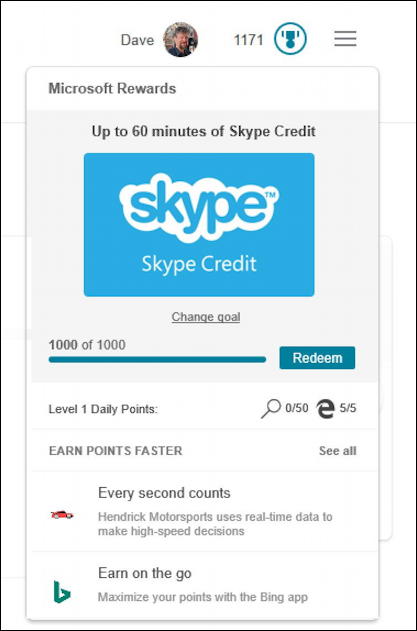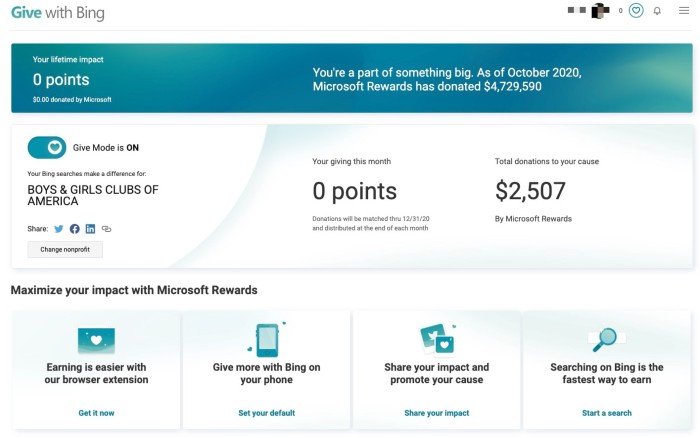

- #CAN MAC USERS GET MICROSOFT REWARDS FOR USING BING UPDATE#
- #CAN MAC USERS GET MICROSOFT REWARDS FOR USING BING UPGRADE#
- #CAN MAC USERS GET MICROSOFT REWARDS FOR USING BING SOFTWARE#
- #CAN MAC USERS GET MICROSOFT REWARDS FOR USING BING CODE#
#CAN MAC USERS GET MICROSOFT REWARDS FOR USING BING UPDATE#
A few versions ago, they removed the ability to turn off update checks in Firefox, so every couple of weeks the browser yells at me to update to the new version, and there's no way to shut it up.
#CAN MAC USERS GET MICROSOFT REWARDS FOR USING BING CODE#
Of course I could check the entire code - it's in Python so it's easy - but I have no time, and this automatic version checking killed the trust I need for such a fundamental tool that I would use all the time. Thirdly, the author thinks this is acceptable, so who know what other irrelevant bits of code he might have snuck in the emulator "for my own good".
#CAN MAC USERS GET MICROSOFT REWARDS FOR USING BING SOFTWARE#
Secondly, updates should be handled by the system, not by the individual packages (programs checking with the mothership is closed-source commercial software behavior). The problem with this is: firstly, a terminal emulator has no business contacting web servers. Why you ask - because after all, the author's heart is in the right place, and it's probably a good thing to keep current, right? Because he deemed it acceptable for a terminal emulator to contact an external web address to check on the latest version, as a default behavior. And I promptly deleted Kitty from all my systems.
#CAN MAC USERS GET MICROSOFT REWARDS FOR USING BING UPGRADE#
And then one day it opened a popup advising me to upgrade to the latest version.Īfter some digging around, I found a menu setting for this automatic checking, and the bit of code that deals with it. It's so good and I was so impressed by its perfor,ances that I started installing it on all my machines. I hate it so much I even ditched a very good open-source software the other day: the Kitty terminal emulator. It is akin to someone letting themselves into your home uninvited to sell you stuff you're not interested about: it's not the stuff they're telling you that's disturbing, it's the fact that they let themselves into your home. The lack of social ability is the nagging in the first place, not even how the nagging message is written. Why, I've even had Apple notifying me of its angry feelings whenever I open, oh, Microsoft Edge.

Perhaps it simply has no better ideas to persuade anyone to try Bing.Īnd really, it's not as if Redmond is alone in pursuing this sort of communication.

Are they all written by engineers? Or robots, perhaps.? Perhaps Microsoft believes that irritation works. What's most distressing is the lack of any attempt at charm or humor in these notifications. But after clicking the popup, it ludicrously opened up all my browsers." I think the 'problem' is that not ALL of my browsers had Bing as the default search engine? Which is ridiculous because I never use Chrome or Firefox anyway. (the latter of which for Microsoft Rewards). Apparently, there are thousands in front of you." The most poignant, perhaps, was this: "Miserably I get this despite using Edge AND having Bing set as my default search engine. There's a little Reddit thread where you'll see laments such as: "You're not the first to have this Microsoft Annoyance. I learned that this Bing-pushing is pushing Windows users' buttons. Bing, the MySpace to Google's Facebook, is still being pushed. The notification adds that you'll get "Search that gives you back time and money." And "fast and secure search results with Bing." Oh, yes. It's warning Windows users that "Microsoft recommends different browser settings. Today ZDNet's "Technically Incorrect" columnist Chris Matyszczyk discussed a new pop-up message that's now appearing in Windows 10's notification center.


 0 kommentar(er)
0 kommentar(er)
